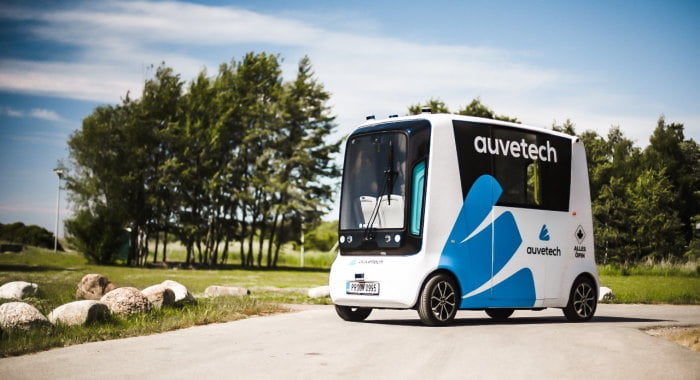The first autonomous hydrogen powered vehicle in the world to be granted road legal status was publicly launched at an event in Tartu on July 5th.
The shuttle bus has been developed by the Estonian autonomous vehicle developer, Auve Tech, in cooperation with the University of Tartu, and has no passed all of the requited tests from the Estonian Road Administration and is allowed to start operating on public roads.
The shuttle which seats up to six passengers is aimed at enhancing 'last-mile' transportation, the difficult part of the public transport systems that covers the journey from bus or train stations to peoples final destination. It might not be fast, flashy, or high-capacity, but it is another incremental step forward for hydrogen-powered vehicles, autonomous driving, and the Estonian clean-tech industry.
One big part of what makes the vehicle really viable is the development of new low-temperature hydrogen fuel cells at the University of Tartu. “Our next-generation fuel cells operate at significantly lower temperatures than previously available on the market. This ensures a significantly longer life for these devices, and they will also be several times safer.” explains Enn Lust, Director of the Institute of Chemistry at the University of Tartu, Professor of Physical Chemistry
The shuttle is capable of autonomous driving both in open spaces and in busy urban areas, and shares the same capabilities as other autonomous vehicles in development from Auve Tech. As well as fully autonomous operation, the shuttle is monitored from and can also, if needed, be controlled from using teleoperation from a remote control centre.
Johannes Mossov, the CEO of Auve Tech says the hydrogen shuttle can work as an environmentally friendly alternative for personal vehicles, "The hydrogen in the fuel cells functions as a power source in the vehicle and the only by-products are vaporised water and heat. The fast charging of the vehicle allows more working hours for the vehicle, increasing the efficiency and introducing a way to integrate autonomous transportation to our everyday lives."
Whatever your personal feelings about autonomous vehicles, it should be hard for anyone to think of more sustainable public, or private, transport as a bad thing. While they are not necessarily synonymous with sustainable fuel, autonomous vehicles are being trialled and showing promise all over the world and are almost always battery or fuel-cell powered. Not many such vehicles have actually been given road legal status and entered use on public roads so far, so this represents a step forward.
Auve are also currently developing another vehicle together with the Estonian ultracapacitor battery company Skeleton Technologies, which will produce a similar shuttle requiring a very short charging time compared to many existing battery powered options.
